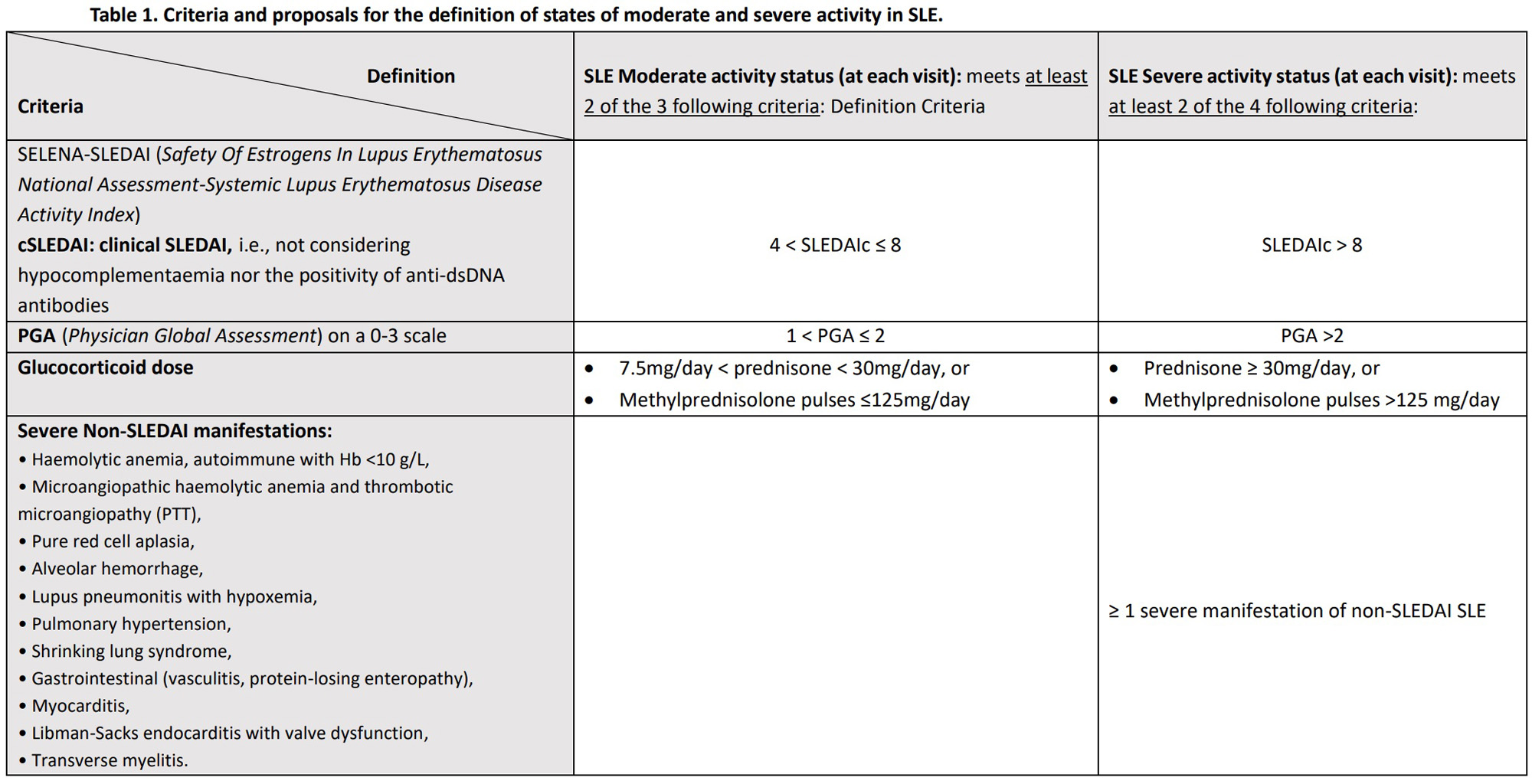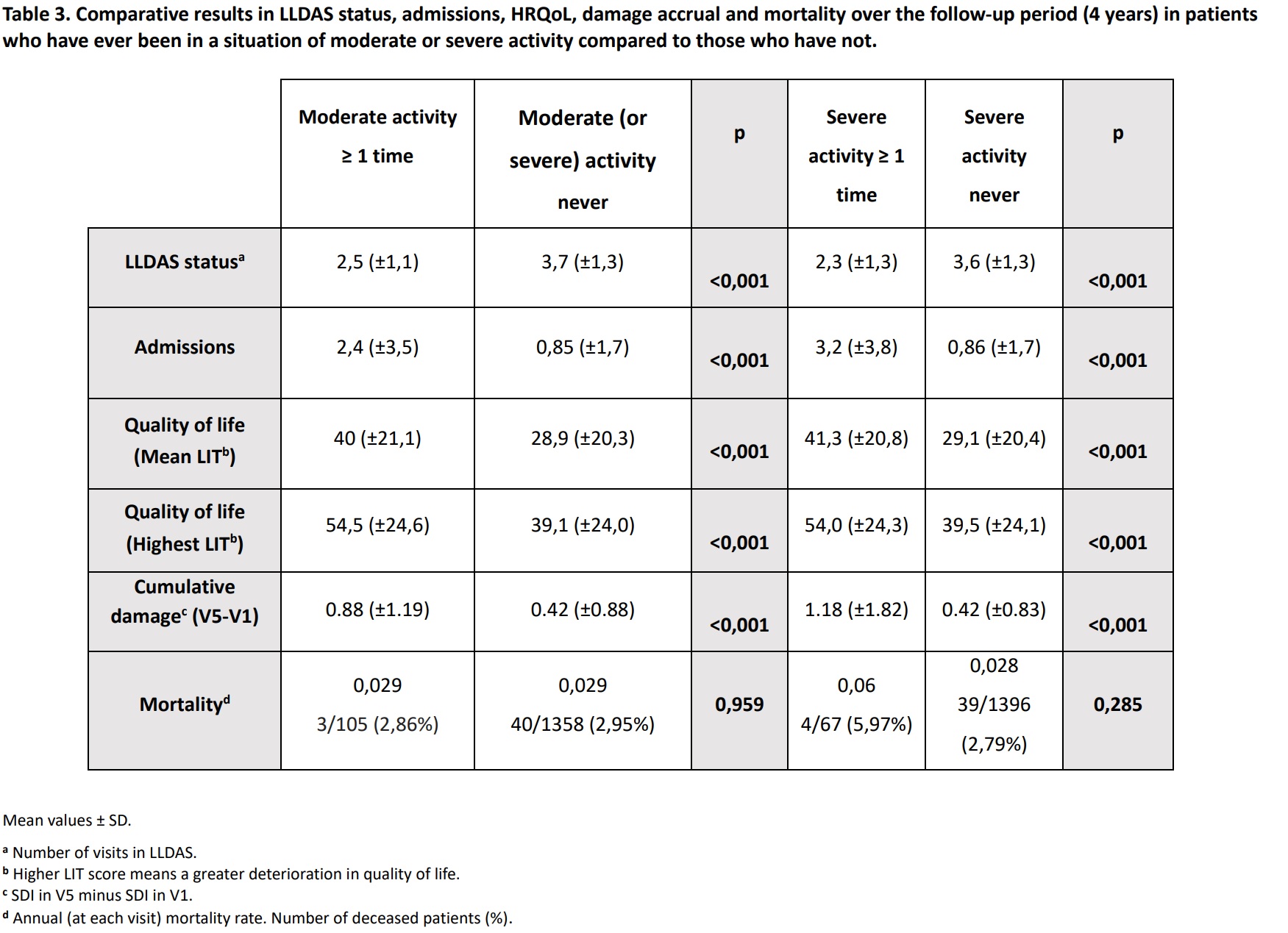Session Information
Date: Tuesday, November 14, 2023
Title: (2257–2325) SLE – Diagnosis, Manifestations, & Outcomes Poster III
Session Type: Poster Session C
Session Time: 9:00AM-11:00AM
Background/Purpose: In systemic lupus erythematosus (SLE), there is no definition of states of moderate and severe SLE activity. How these states may influence different disease outcomes is unknown.
To propose a definition for states of moderate and severe activity in SLE and using the largest Spanish national cohort of SLE patients, to describe the prevalence of both states of activity and to analyze the impact of this classification on flare-ups, achieving low disease activity state (LLDAS), hospital admissions, health-related quality of life (HRQoL), damage accrual and mortality.
Methods: We propose definitions for states of moderate and severe activity in SLE (Table 1). To analyze the impact of this classification, available data from the prospective phaseof the Spanish Society of Rheumatology SLE Registry (RELESSER-PROS) were used, with 5 annual visits (V1-V5) over 4 years. Patients were required to have at least 3 consecutive visits. At each visit, the number of flares and their severity (according to the SELENA Flare Index), visits in LLDAS, hospital admissions, HRQoL according to the Lupus Impact Tracker (LIT), damage accrual (using the SLICC/ACR Damage Index [SDI]) and mortality was collected. T-test was used for group comparisons.
Results: A total of 1463 patients (90% women) were included, with a mean age (±SD) of 56 (±13.5) years. The mean disease duration of SLE (±SD) at V1 was 14 (±8.5) years. Patients had a mean (±SD) of 4.2 (±1.2) visits and a mean (±SD) follow-up of 2.5 (±0.7) years. Moderate activity was shown by 54 patients (3.7%) at V1, 20 patients (1.4%) at V2, 27 patients (1.8%) at V3, 5 patients (0.3%) at V4, and 11 patients (0.8%) at V5. On the other hand, 40 patients (2.7%) at V1, 15 patients (1.0%) at V2, 13 patients (0.9%) at V3, 6 patients (0.4%) at V4 and 3 patients (0.2%) at V5 showed severe activity. Patients who presented both moderate and severe activity in at least 1 of the 5 visits had a significantly higher mean total number of flares over the 4-year follow-up period (V1-V5)than those who did not (p< 0.001). These same results occur in the case of severe flares. Regarding mild-moderate flares, patients with moderate and severe activity in at least 1 visit, had a higher mean number than patients without these activities, being statistically significant for moderate activity. More detailed information about flares can be seen in Table 2. On the other hand, patients who presented both moderate and severe activity in at least 1 of the 5 visits had significantly less number of visits in LLDAS, higher number of hospital admissions, worse HRQoL and greater damage accrual in the period V1-V5 than those who did not (p< 0.001 for all comparisons). Patients with severe activity in ≥1 visit had higher mortality (p=n.s.) (Table 3).
Conclusion: Patients who were in a state of moderate and/or severe activity at least on 1 occasion had worse outcomes at the end of follow-up in terms of number/severity of flares, hospital admissions, deterioration in HRQoL and damage accrual. These results emphasize the importance of setting achievable objectives in the Treat to Target (T2T) strategy for the treatment of SLE.
who have ever been in a situation of moderate or severe activity compared to those who have not.
To cite this abstract in AMA style:
Mamani Velarde I, Rúa-Figueroa I, García Pérez S, Altabás González I, Mourino Rodriguez C, Jiménez N, MARTINEZ BARRIO J, Galindo-Izquierdo M, Calvo- Alén J, Eurasquin C, Serrano Benavente B, Uriarte Isacelaya E, Tomero Muriel E, Freire González M, Blanco R, Salgado-Pérez E, Vela P, Fernandez-Nebro A, Olivé-Marqués A, Sanguesa Gomez C, Narvaez J, Menor-Almagro R, Rosas J, Hernández Beriain J, MANERO J, Aurrecoechea Aguinaga E, Ibarguengoitia-Barrena O, Montilla-Morales C, Bonilla G, Torrente-Segarra V, Cacheda A, García-Villanueva M, Moriano Morales C, Fito Manteca C, Lozano Rivas N, Bohórquez C, Pego-Reigosa J. Proposal for Defining Moderate and Severe Activity States in Systemic Lupus Erythematosus. Impact on Flares and Other Outcomes [abstract]. Arthritis Rheumatol. 2023; 75 (suppl 9). https://acrabstracts.org/abstract/proposal-for-defining-moderate-and-severe-activity-states-in-systemic-lupus-erythematosus-impact-on-flares-and-other-outcomes/. Accessed .« Back to ACR Convergence 2023
ACR Meeting Abstracts - https://acrabstracts.org/abstract/proposal-for-defining-moderate-and-severe-activity-states-in-systemic-lupus-erythematosus-impact-on-flares-and-other-outcomes/



